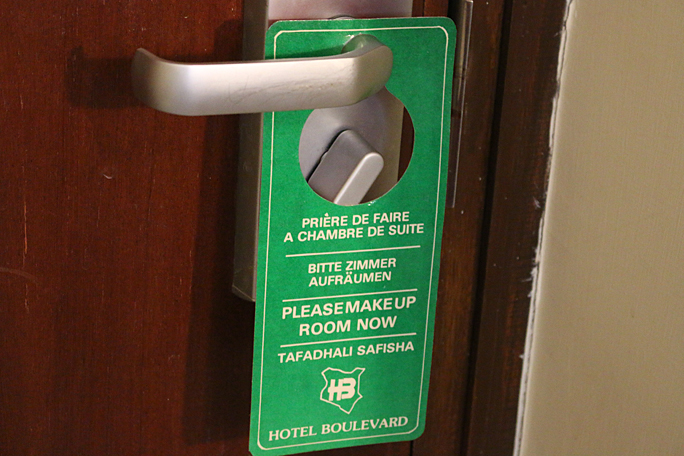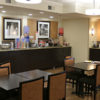T his article pertaining to 12 Essential Hotel Room Safety Tips — written by Paul Riegler of Frequent Business Traveler magazine this past week — has some good information; and I have added my own thoughts based on my personal experiences.
Prior to Arrival
1 Before booking your stay, look at the area surrounding the hotel. Is it considered safe by locals? Is it safe to walk around after dark? Are crime and/or terrorism a threat in the city you will be visiting? Although it is a good idea to check reviews posted on Internet web sites such as FlyerTalk, Milepoint, Lonely Planet and TripAdvisor to get more information about the area in which a hotel property is located, I also like to use the street view functionality of Google Maps — if available — to get a visual sense of the overall location.
2 With respect to choosing a hotel, find out if the front desk is staffed 24 hours a day. Is access to guest floors restricted by key card or some other means? As with two hotel properties at which I stayed recently in Nairobi, you might also want to check whether the hotel property has a manned gate or a checkpoint scanner to screen people.
Once Checked In
3 When checking in, avoid a ground floor room if possible. Many experts recommend a room as low as the third floor and as high as the sixth, making break-ins unlikely but your floor will be low enough so that fire department ladders can reach you should an emergency arise. Additionally, a room on the ground floor potentially offers less privacy if you like to have the curtains or blinds open, which I do. Also, keep in mind that the first floor is not necessarily the ground floor — especially if the hotel property is on a hill, such as a recent stay I experienced at the Grand Hyatt Muscat. A review of that hotel property is forthcoming.
4 Once in your room, keep the door locked at all times. This includes deadbolts, security chains, and those newer swinging metal security bars. Don’t leave your door propped open – ever – even if just running down the hall. If for nothing else, you might be amazed at how often a guest is mistakenly assigned a room which is already occupied — and the key usually works. Using deadbolts, security chains and swinging metal security bars can at least prevent an unintentional entrance by a fellow guest of the hotel property.
5 If someone knocks on your door claiming to be hotel staff and you haven’t requested the service, call the front desk before opening the door to verify that it is in fact a hotel employee. Additionally, use the peep hole of the door of your room to help verify that there is indeed an employee of the hotel property at the door of your room. An unannounced knock on the hotel room door sometime after dinner time in a higher-end hotel usually is by a hotel employee who is offering turn-down service; and there is usually a hotel cart accompanying the employee, who is usually wearing a uniform with a name tag. Hey — I may not want the turn-down service; but I like the little chocolates they offer anyway! If you still feel suspicious, you can either open the door with the security chain still attached; or simply do not answer the door altogether.
6 Protect valuables including important papers and passports by leaving them in the room safe which, although not 100% secure, offers protection from casual interlopers. “Although not 100% secure” is an understatement, unfortunately; and I would not follow this particular piece of advice. Please read this article as well as this article to find out why; as well as watch the video accompanying this article. Rather, keep your important papers on your person — as I always do — or take them down to the front desk and ask the agent to store them in the hotel safe.
7 American Airlines, currently the world’s largest airline, tells its crews in training that, when traveling alone and leaving a hotel room on a layover, a crew member should leave a note with the time he is leaving and the destination. I have nothing to add here.
8 Finally, if you invite someone back to your room whom you don’t know terribly well (if at all), make sure any valuables including jewelry and your wallet are in the safe and make sure your clothing and personal items are put away. For the aforementioned reason stated in item number 6, I personally would not follow this advice. Rather, what I do is place items in unlikely spots in the room which are difficult to reach — such as the back corner of a high shelf in a closet or behind a drawer in a dresser. This is not so much to hide the items; but rather to increase the difficulty of searching to find them. Better yet: try to avoid bringing back people to your hotel room altogether unless you trust them or have no reason to be concerned about them.
When Leaving the Room
9 Always make the room appear to be occupied by leaving the television or radio on. In addition, put the “Do Not Disturb” sign on the door. (We at FBT leave the DND sign on the door throughout our stays regardless of whether the room is occupied.) While thieves know these tricks too, they are more likely to go somewhere else. This is true, as thieves consistently like the easiest targets. Sometimes taking a moment to turn the television or radio on while hanging the Do Not Disturb sign is all it takes for a thief to decide to choose what could be considered a significantly easier target — such as a quiet unoccupied room — and avoid your room. Additionally, if you actually have a room which still has a Please Make Up Room Now sign — rare these days — do not use it because that announces to the world that your room is not occupied.
Additional Tips
The American Hotel and Lodging Association, an industry trade group, has several additional suggestions including:
10 If you lose your room key, have the hotel disable the first one when making a replacement. Better yet, do not lose your room key in the first place. I do not ever recall losing a room key in my travels; and I attribute that to keeping my room key with my important papers on my person — usually in a front pants pocket.
11 Make sure any sliding glass doors and windows are locked and fully secured. This is a good idea whether or not you are occupying your hotel room. Even if you are on a higher floor, someone can access your room if a balcony from an adjacent room — or from a room one floor below or above your room — is close enough to the balcony or patio of your room.
12 Always locate the nearest emergency exit and staircase upon arrival at a hotel. This is easy to do with the diagram on the back of the door of your hotel room; as well as physically finding that exit yourself — all of which will take a moment of your time.
Summary
Regardless of where you are when traveling, constantly be aware of your surroundings; and at least look like you know what you are doing. If a potential thief really wants to steal something from you, that person will do it if he or she is determined enough; but any tactics which you can implement to help deter the thief will reduce the likelihood of something happening to you. Similarly, do whatever you can to protect yourself from a person who may want to attack someone for whatever nefarious reason. Keep yourself off of the “radar” of that person by taking an extra moment or two to be prepared in case anything goes wrong.
For additional information on how to keep your financial information as secure as possible — whether in a hotel room, at home or elsewhere — please read this comprehensive article pertaining to Identity Theft and Credit Card Fraud: What You Can Do and How to Reduce Your Risk.
By all means, please feel free to share your essential hotel room safety tips as well.
Photograph ©2015 by Brian Cohen.

